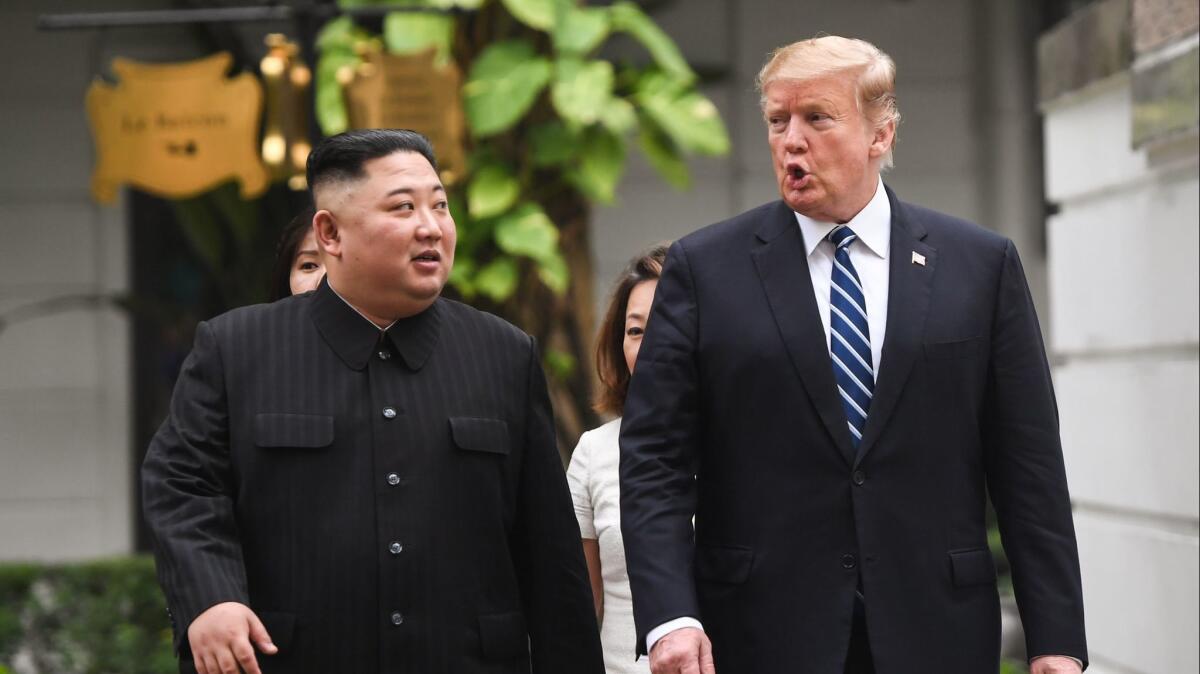Editorial: Trump wisely walks away from his North Korea summit without a (bad) deal

- Share via
The abrupt end to President Trump’s summit meeting with North Korea’s Kim Jong Un may strike some as a huge embarrassment for a president who portrays himself as the ultimate dealmaker. It wasn’t. Instead, Trump deserves credit for leaving Vietnam when he concluded that Kim was insisting on unreasonable terms — the lifting of all U.S. economic sanctions if the North dismantled its nuclear complex in Yongbyon.
Before the summit, it was thought North Korea might decommission that site in exchange for the U.S. agreeing to a formal statement ending the Korean War and perhaps relief from some sanctions. But Trump said Kim demanded much more: the lifting of sanctions “in their entirety.” Added Trump, “We couldn’t do that.” (North Korean foreign minister Ri Yong Ho disputed Trump’s account, saying that the North asked for the lifting of only those sanctions that “hamper the civilian economy and the livelihood of our people.”)
Trump and his advisers had indicated they were willing to make concessions and accept incremental steps from North Korea rather than immediate denuclearization. Reportedly the administration was even willing to defer its demand that the North provide an inventory of its nuclear stockpile and ballistic missiles. But in the end, Kim apparently wasn’t content with such concessions.
The president’s decision to leave without even a vague agreement is especially notable in light of his boasting about his personal relationship with Kim. (He had said, only half-jokingly, that “we fell in love.”)
But it was still the right decision, and it doesn’t necessarily mean the engagement is over or that the U.S. and North Korea won’t reach an agreement in the future.
Enter the Fray: First takes on the news of the minute »
In 1986, President Ronald Reagan walked away from a summit with Soviet leader Mikhail Gorbachev in Reykjavik, Iceland, after failing to reach a sweeping agreement on reducing nuclear arsenals. But the U.S. and the Soviets continued to communicate, and in 1987 Reagan and Gorbachev signed the Intermediate-Range And Shorter-Range Missiles (INF) treaty, which grew out of discussions in Reykjavik. (Irony alert: The Trump administration has announced that the U.S. is withdrawing from that agreement.)
Trump has been widely criticized for being too eager to “make a deal” and overconfident in his ability to bond with foreign leaders. His decision to reject an unacceptable offer from Kim may reflect the counsel of harder-headed advisers, but the final decision was his. He has acted against type, and his critics should thank him for that.
Follow the Opinion section on Twitter @latimesopinion and Facebook
UPDATES:
1:07 p.m.: This editorial was updated with a comment from North Korea’s foreign minister.
More to Read
A cure for the common opinion
Get thought-provoking perspectives with our weekly newsletter.
You may occasionally receive promotional content from the Los Angeles Times.






